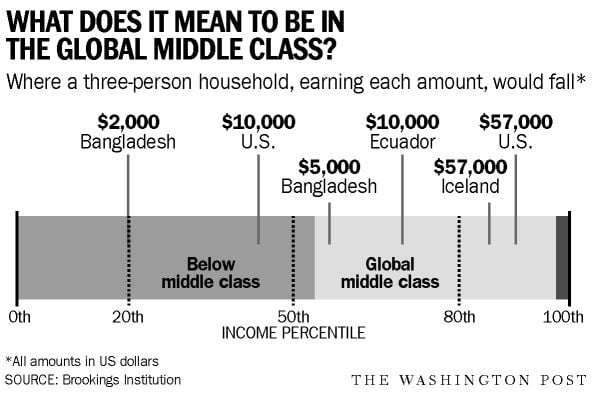

In the below graph, the alternatively shaded sections represent the different decile groups. The first decile group contains the poorest 10% of the population, the second decile group contains the next poorest 10% and so on. When we assess the distributional implications of tax and social security changes, we often divide the population into ten equally sized groups, called decile groups. Your position in the distribution is shown by the red bar. Around %, or million individuals, have incomes higher than this, after adjusting for the size and composition of their households. Each bar corresponds to an income band of about £, and to maintain a reasonable scale, it has been necessary to truncate the distribution at incomes above around £ per week.
#Upper middle class salary how to#
How to understand the graph : A picture of the United Kingdom income distribution is shown below, with all incomes expressed in terms of the equivalent amount for a household of your type. With a household after tax income of £ per week, you. "So if you're a politician," said May, "whether you're a Trump or you're a Prime Minister Trudeau and you said 'we're going to grow the middle class?' I'm with you.Taking into account household size and composition (click here to see how), we have calculated your position in.

And every politician wants the biggest chunk of votes. And politicians know that the greatest single chunk of Canadians believes the middle class is them. The bottom line? It's pretty much a personal definition. "It's so broad that approximately every Canadian could be labelled as 'middle class."' You'd be forgiven for thinking, well, isn't that pretty much everyone?Īt the time, Stephen Gordon, an economist at Laval University, told CBC News, "I'd put this in the 'not useful' category," because it would be difficult to base policy on such a definition, especially if you were aiming to target economic benefits. "Middle-class values are values that are common to most Canadians from all backgrounds, who believe in working hard to get ahead and hope for a better future for their children." To muddy it further, this is how Liberal Transport Minister Marc Garneau described middle class in the House of Commons in May of that same year: Minister of Transport Marc Garneau offered his government's definition of middle class in the House of Commons in 2017.

The only exception was in Ontario, where the figure was 68 per cent. Still, a poll done for Maclean's in 2017 found that 70 per cent of respondents - regardless of demographic or where they lived - considered themselves middle class. A family of four earning that $90,000 in downtown Vancouver or Toronto could be living a very different life than one living in, say, Charlottetown or Regina. In 2015, Justin Trudeau spoke in an interview with Peter Mansbridge about "the middle-class tax bracket" as being from $44,000 to $89,000, and a "typical" family of four being one that earned $90,000 a year.īut where you live also makes a huge difference. There's a huge range of needs and experiences." " don't have all the same opinions and attitudes about taxation, they don't have the same opinions and attitudes about immigration.

We're middle class."īut at the same time, he says, middle class is no monolith. We pay our taxes, we own a home, we drive a car. We're not too rich, we're not too poor. We don't have any particularly radical views on anything. "Middle class is, to me, the quintessential reflection of a polite Canadian. 'I think essentially they're talking about people who go and vote,' said Wolfgang Lehmann, Western University chair of sociology. "The more you go into it, the more you realize it becomes a dark and tangly mess," said Doug May, professor of economics at Memorial University. (Read: unlike Trudeau, who grew up privileged). A single adult at the low end of the upper-income range making 103,200 would need to make 131,078 as a household of 2 people to stay at the same level. The gap between middle- and upper-income households grows the more people join a household. And so he talks about how he grew up in a "middle-class" household, and how he "gets" what the average Canadian is going through. The same thing happens at the opposite end of the income spectrum. The push from Andrew Scheer's campaign is to make him the "average guy" - a guy like you or the guy next door. The Conservatives are using the trope, too. The tactic worked for Justin Trudeau in 2015 and so, in nearly every appearance of this campaign, Trudeau has again spoken about improving the lives of "the middle class and those working hard to join it." Make things better for the middle class, invest in the middle class, grow the middle class - all ultimately a bid to win the vote of the middle class. Before this election campaign even began, Canadians must have known they'd be hearing a lot about the middle class in the lead-up to Oct.


 0 kommentar(er)
0 kommentar(er)
